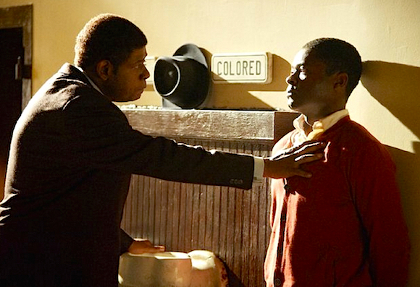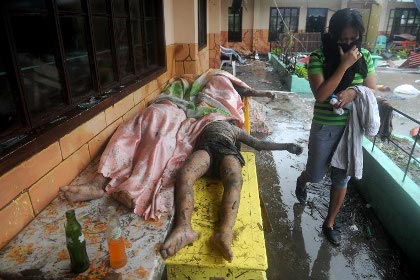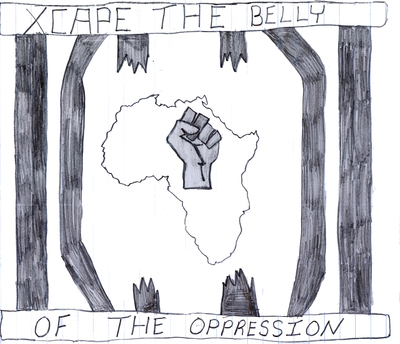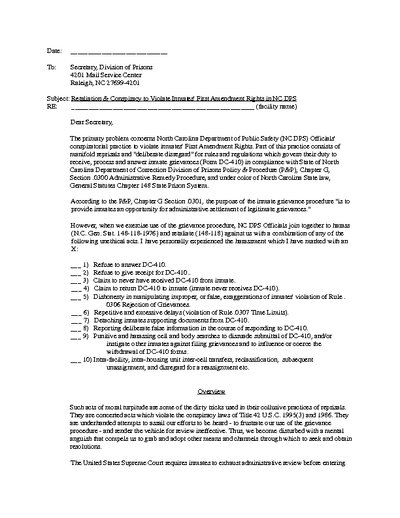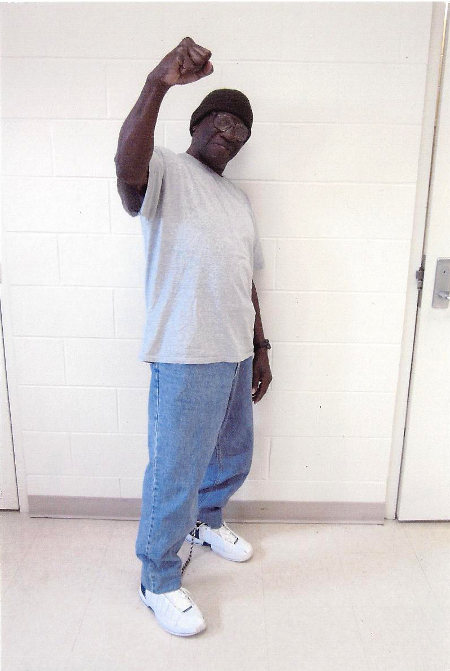
Lenin Statue Toppled in Power Struggle in Ukraine
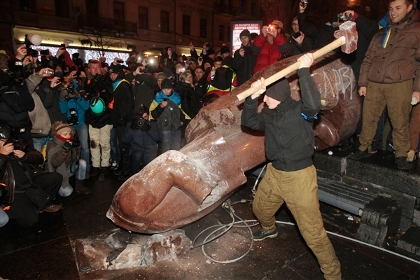
Images of a statue of communist leader V.I. Lenin being torn down in Kiev have been celebrated in the Western press, as hundreds of thousands of Ukrainians took to the streets to protest the current regime headed by president Viktor Yanukovych.
Much of the coverage of the recent protests in Ukraine condemn government corruption as the common complaint of the protestors, linking it to Ukraine’s Soviet past. The association is that this is the legacy of communist rule. In contrast, we would argue that this corruption was the result of economic Liberalism taking hold in the former Soviet Union where bourgeois democracy was lacking. Today’s protests are largely inspired by a desire for bourgeois democracy, and the perceived economic benefits it would provide over the current rule by a parasitic bourgeoisie with little interest in the national economy.
The rise of Kruschev to lead the Union of Soviet Socialist Republics (USSR) after Stalin’s death marked the victory of the capitalist roaders within the Communist Party, and the beginning of the era of social-imperialism for the Soviet Union. This lasted from 1956 until the dissolution of the Union in 1991, when Ukraine became an independent republic. The period was marked by moving away from a socialist economy structured around humyn need and towards a market economy guided by profit. This transformation was reflected in the ideology of the people who more and more looked towards the imperialist countries and their crass consumerism as something to aspire to. It also led those in power to have more interest in their local regions than in the prosperity of the Union as a whole.
Even under capitalism, the Soviet Union was more prosperous and more stable than after its dissolution. In 1991, an estimated three quarters of the Soviet people supported maintaining the Union, but the leadership had no motivation to do so.(1) A move towards strengthening the Union would awaken the proletarian interests, which were opposed to the interests of the leadership that was now a new bourgeoisie. Ukraine played a key role in initiating the dissolution of the USSR. And it was no coincidence that in Ukraine, in particular, the dissolution was an economic disaster as the former Soviet nations were tossed to the wolves of economic Liberalism. A small emerging capitalist class took advantage of fixed prices that were a legacy of the Soviet economy and sold cheaply obtained raw materials at market rates to other countries. They turned around and invested that capital outside in international markets while tightening monopolies on trade at home. This was one of the most drastic transfers of wealth from the hands of the producers to the hands of capitalists in recent decades.(2)
Ten years after the October Revolution of 1917, Stalin wrote, “the resultant dropping out of a vast country from the world system of capitalism could not but accelerate [the process of the decay and the dying of capitalism]”.(3) The inverse of this is also true, to a degree: the reentry of many countries into the world system breathed life back into it. While this brought great change at the hands of the newly empowered national bourgeoisie in those countries, it did not change the fact that imperialism had already made capitalism an economically regressive system. Hence they did not develop the wealth of their nations as the rising bourgeoisie of centuries past had done by improving production and developing trade. Today’s rising bourgeoisie restricts markets via monopolies, and heads straight for high-margin business like drugs, weapons and financial markets. What happened in the ex-Soviet countries is a good demonstration of why Libertarian ideals are not relevant in today’s economy.
The underground economy had been growing for decades before 1991, and this new freedom to compete was a boon to the criminal organizations that existed. These mafias were on the ground with direct access to the resources of the people before the imperialists had time to fight over these newly opened economies. With rising nationalism in the republics, Russian imperialism had to keep its distance, while other imperialist countries had no base in the region to get established. The inter-imperialist rivalry over the region is playing out today.
In the early years of independence, the Ukrainian state merged with that criminal class that was taking advantage of the political and economic turmoil in the country.(4) As a result the GDP dropped to a mere third of what it was just before the Union dissolved.(5) This came after decades of declining economic growth after the initial shift away from socialist economics. The mafias in the former Soviet countries saw an opportunity to seize local power and wealth in their respective republics as the super power crumbled. Some were further enticed by Amerikan bribes, such as Russian President Boris Yeltsin’s family who received billions of dollars.(6) For a time there was hope that these changes would improve economic conditions as the bourgeois Liberal mythology led the former Soviet peoples to believe that they could follow the advice (and political donations) of the United $tates.
This mess, which the region is still struggling with, was the ultimate result of what Mao Zedong said about the rise of a new bourgeoisie within the communist party after the seizure of state power due to their inherent privilege as directors of the state. A successful socialist project must combat these bourgeois tendencies at every turn in order to prevent the proletariat from suffering at the hands of a new bourgeois exploiting class. At the core of the Cultural Revolution was combating the theory of productive forces, which Mao had previously criticized the Soviet Union for implementing. The turn to the western imperialist countries as economic models was the logical conclusion of the theory of productive forces in the Soviet Union.
One of the messages underpinning today’s protests in Ukraine is the desire to move closer to the European Union (EU), as opposed to the Russian sphere of influence. It seems that looking to the west for hope has only increased in Ukraine over the last couple decades. But there is no obvious advantage to becoming a client of imperialist Western Europe over imperialist Russia except for the higher concentration of super-profits in the EU. And as other newcomers to the EU can attest, the imperialist nations in Europe will oppose any perceived distribution of their super-profits to the east. Similar nationalism is fueling the Ukrainian protestors who oppose the perceived transfer of wealth from their country to Russia. In general, increased trade will help a country economically. But in this battle Russia and the EU are fighting to cut each other off from trading with Ukraine. As always, capitalism tends towards monopolies and imperialism depends on monopsonies.
It is little wonder that the masses would be unsatisfied living under the rule of corrupt autocrats. Yet, it was just 2004 when the U.$.-funded so-called “Orange Revolution” threw out a previous mafia boss named Leonid Kuchma.(7) This regime change gained support from those making similar demands to today’s protestors, but it did not change the nature of the system as these protests demonstrate. And that orchestrated movement was no revolution. It was a mass protest, followed by a coup d’etat; something that the imperialists have been funding quite regularly in central Eurasia these days. A revolution involves the overthrow of a system and transformation to a new system, specifically a change in the economic system or what Marxists call the mode of production. We don’t see any movement in this direction in Ukraine from where we are, as nationalism is being used as a carrier for bourgeois ideologies among the exploited people of Ukraine, just as Stalin warned against.
Rather than a revolutionary anti-capitalist/anti-imperialist movement, the criminal corruption in Ukraine has led to right-wing populism in recent years. This was marked by the surge of the Svoboda party into the parliament. The men who toppled the statue of Lenin and smashed it with sledge hammers waved Svodoba flags as they did so, indicating that they represented not just a vague anti-Russia sentiment, but a clear anti-socialist one.
Svodoba’s populism challenges the current ruling bourgeois mafia, while their nationalism serves to divide the proletariat by inflaming various grudges in the region. This is in strong contrast to the revolutionary nationalism supported by Lenin and Stalin and by Maoists today. In a criticism of the provisional government prior to the October Revolution in 1917, Lenin wrote on Ukraine:
“We do not favour the existence of small states. We stand for the closest union of the workers of the world against ‘their own’ capitalists and those of all other countries. But for this union to be voluntary, the Russian worker, who does not for a moment trust the Russian or the Ukrainian bourgeoisie in anything, now stands for the right of the Ukrainians to secede, without imposing his friendship upon them, but striving to win their friendship by treating them as an equal, as an ally and brother in the struggle for socialism.”(8)
This is a concise summary of the Bolshevik line on nationalism.
A Note on Class and Criminality
Without doing an in-depth class analysis of Ukraine, we can still generalize that it is a proletarian nation. Only 5.1% of households had incomes of more than US$15,000 in the year 2011.(9) That mark is close to the dividing line we’d use for exploiters vs. exploited internationally. Therefore we’d say that 95% of people in Ukraine have objective interests in ending imperialism. This serves as a reminder to our readers that we say the white nation in North Amerika is an oppressor nation, not the white race, which does not exist.
While official unemployment rates in Ukraine have been a modest 7 to 8% in recent years, the CIA Factbook reports that there are a large number of unregistered and underemployed workers not included in that calculation. That unquantified group is likely some combination of underground economy workers and lumpen proletariat. In 2011, the Ukrainian Prime Minister said that 40% of the domestic market was illegal,(10) that’s about double the rate for the world overall.(11) On top of that, another 31% of the Ukrainian market was operating under limited taxes and regulations implemented in March 2005, which were put in place to reduce the massive black market. In other words, the underground economy was probably much bigger than 40% before these tax exemptions were put in place.
One way we have distinguished the lumpen is as a class that would benefit, whether they think so or not, from regular employment. This is true both for the lumpen-proletariat typical of today’s Third World mega-slums, and the First World lumpen, even though “regular employment” means very different things in different countries. While there is a portion of the lumpen that could accurately be called the “criminal” lumpen because they make their living taking from others, we do not define the lumpen as those who engage in crime. Of course not, as the biggest criminals in the world are the imperialists, robbing and murdering millions globally.
For the lumpen, the path of crime is only one option; for the imperialists it defines their relationship to the rest of humynity. Crime happens to be the option most promoted for the lumpen by the corporate culture in the United $tates through music and television. And in chaotic situations like the former Soviet republics faced it may be the most immediately appealing option for many. But it is not the option that solves the problems faced by the lumpen as a class. Ukraine is a stark example of where that model might take us. As the lumpen proletariat grows in the Third World, and the First World lumpen threatens to follow suit in conditions of imperialist crisis, we push to unite the interests of those classes with the national liberation struggles of the oppressed nations that they come from. Only by liberating themselves from imperialism can those nations build economies that do not exclude people.
Among the bourgeoisie, there are few who are innocent of breaking the laws of their own class. But there are those who operate legitimate businesses and there are those who operate in the underground market. This legality has little bearing on their class interests. All national bourgeoisies support the capitalist system that they benefit from, though they will fight against the imperialist if their interests collide.
So there is no such thing as “the criminal class” because we define class by the group’s relationship to production and distribution, and not to the legality of their livelihoods. And we should combat the influence of the bourgeois criminals on the lumpen who, on the whole, would be better served by an end to imperialism than by trying to follow in their footsteps.
While the Ukrainian people push for something more stable and beneficial to them, the Russian imperialists face off with the EU. The EU is backed by the United $tates who has publicly discussed sanctions against Ukraine justified by hypocritical condemnation of the Ukrainian government using police to attack peaceful protests. Hey John Kerry, the world still remembers the images of police brutality on Occupy Wall Street encampments.
The real story here may be in the inter-imperialist rivalry being fought out in the Ukrainian streets and parliament. While the Ukraine nation has an interest in ending imperialism, the dominant politics in that country do not reflect that interest. And one reason for that is the lasting effects of mistakes from the past, which still lead to subjective rejection of communism for many Ukrainians in the 21st century. This only further reiterates the importance of the Great Proletarian Cultural Revolution and the need to always put politics in command in building a socialist economy to prevent the future exploitation and suffering of the peoples of the world. This is likely a precursor to much more violent conflict over the rights to markets in the former Soviet republics. Violence can be prevented in the future by keeping the exploited masses organized on the road to socialism.








